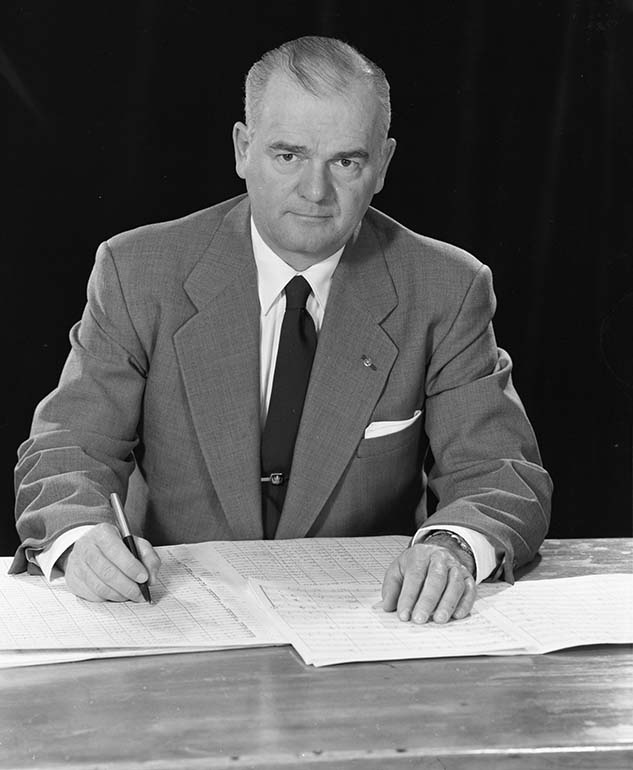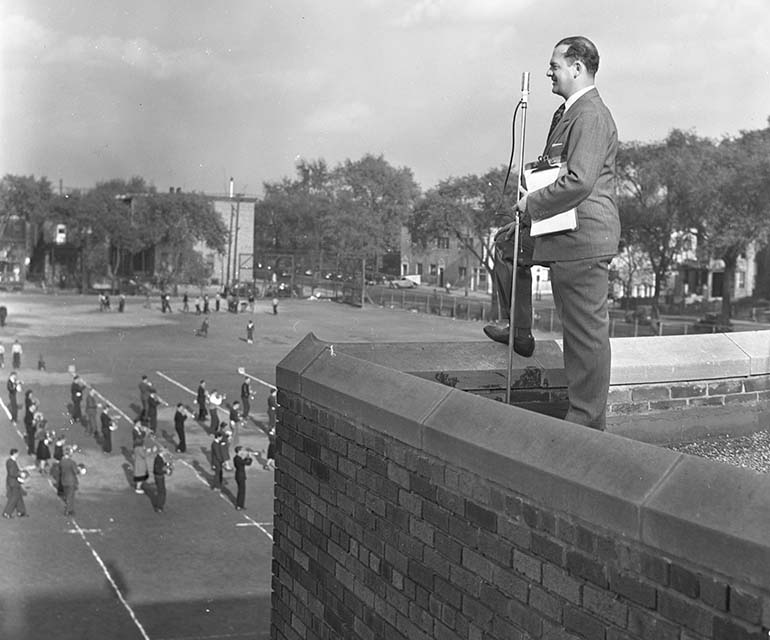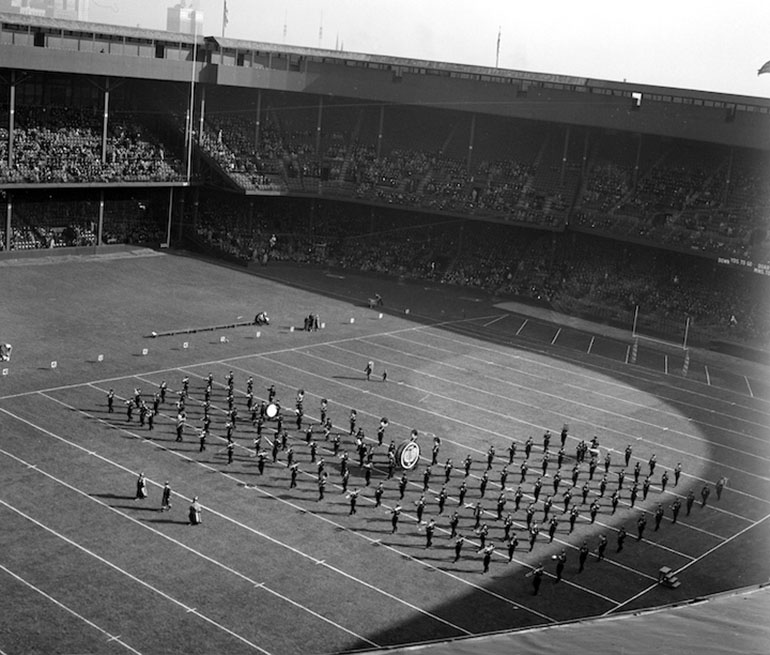
DETROIT – The Detroit Lions’ fight song, “Gridiron Heroes,” has gained greater attention this year, thanks to a pair of nationally televised home playoff wins and its inclusion in the popular video game Madden 24.
The song – played after every Lions’ touchdown at Ford Field – also has a deep-rooted connection to Wayne State University. It was written by a WSU professor in 1937.
“There’s not much poetry there, but it’s the kind of a song that resonates with the people because the lyrics are pretty straightforward,” said Norah Duncan, Ph.D., a Wayne State professor of music.
Forward down the field,
A charging team that will not yield.
And when the Blue and Silver wave,
Stand and cheer the brave.
Rah, Rah, Rah.
Go hard, win the game.
With honor you will keep your fame.
Down the field and gain,
A Lion victory!
Duncan knows the song well. He used to sing it with the iconic Johnny Trudell Orchestra following each Lions touchdown at the Silverdome and the first season at Ford Field. Duncan was with the band from 1998 to 2003.
But it was Graham T. Overgard – a Wayne State music professor and band director, who simultaneously served as the Lions’ entertainment director from 1937 to 1968 – who wrote the lyrics and music when owner G.A. Richards asked that he create a fight song for Detroit’s newest sports franchise.
Overgard recorded “Gridiron Heroes” at the famous United Sound Systems Recording Studios on Second Avenue. The recording was performed by Bert Diekes and the Sammy Dibert Orchestra.
Bill Keenist, a Lions historian and former public relations director, said the team nearly settled on a different melody as the official song. It seems Richards and team executives considered “Barney Google” and “Man on the Flying Trapeze” before selecting Overgard’s tune.
“Thank goodness Graham got it over the goal line,” said Keenist, laughing. “Yeah, he scored, no question.”

Overgard was known for instituting pageantry into halftime shows, adding sophisticated marching band formations, peppier music, and choregraphed flags and dance routines.
His showmanship was highlighted in the Lions’ preseason opener at Briggs Stadium on Sept. 4, 1953. That week, the Detroit Free Press published a story titled, “Night Shall be Filled with Footballs — and Music.” The story heralded Overgard, who was beginning his 17th season as director-producer of the halftime shows, and the impressive array of world-renowned talent he amassed for the game, including legendary trumpeter Louis Armstrong and saxophonist Charlie Ventura. They were joined by 500 marching musicians and drum majorettes from Michigan and Canada, as well as Sammy Dibert and his Lions band.
The Free Press predicted the halftime show would be, “one of the greatest musical spectacles in professional football history.”
Overgard’s other work included improving Wayne State’s music library and composing songs for other teams and schools, like Ferris State University’s alma mater, “Ferris Fidelity,” and its fight song, “Fighting Bulldogs.” He published the song “Tartar Men” for Wayne State in 1938. He even scored songs for songwriters and composers like Duke Ellington, Louis Alter, Sigmund Romberg and Peter DeRose.

Eventually, Harold Arnoldi, a Wayne State graduate turned music professor, succeeded Overgard as the Lions’ entertainment director, a role he held into the late 1990s. He continued his mentor’s tradition of playing the fight song after every Lions score and inviting Wayne State’s marching band to perform it at halftime of the annual Thanksgiving Day game.
Despite generations of Lions fans who have grown up listening and singing along to “Gridiron Heroes,” the music did fall silent during some dark seasons, but was revitalized in 1991 after owner William Clay Ford was serenaded by Washington fans during a lopsided 45-0 loss at RFK Stadium.
“Every visiting owner has a suite or a box at the stadiums, and at old RFK, the box was located relatively close to the fans,” Keenist said. “After every score – and there were a lot of them that night – they played ‘Hail to the Redskins,’ and the fans stood up, turned toward Mr. Ford and sang that fight song, which at the time was probably as popular as any team fight song.
“I think that night in D.C. probably fueled some of that desire for Mr. Ford to make our song more of a tradition at Lions games. And it worked because we really made a concerted effort to try to get it in front of every fan at the stadium. We would put the lyrics on the scoreboard and just try to encourage people to sing along. Now, it's a done deal, I mean, fans look forward to that.”
Wayne State alumnus Jeff Cutter, B.A. ’78, M.A. ’94, knew Arnoldi well and met Overgard once at a Silverdome event.
“There was a grand-opening ceremony at a marching band contest in November 1975, and he came to see the U.S. Navy band play,” said Cutter, who was the Lions’ entertainment director from 1999 to 2003. “He was a nice, older man.”
As a student, Cutter was a member of Wayne State’s band and performed in the final Thanksgiving game at Tiger Stadium, in 1974. “My keys kept freezing,” Cutter said, referring to the challenges of playing a brass instrument in cold and snow.
Though the Lions moved to the Pontiac Silverdome the following year, Cutter said the band still faced obstacles.
“Arnoldi said it was going to be nice inside; 75 degrees, nice and warm,” Cutter said. “It was raining on us. They didn’t have the roof finished yet. There was snow on the roof and water was pouring down on us as we were playing.”
Though some would like to see the Lions use a modern song to celebrate scores, Keenist says Overgard’s melody stands the test of time.
“It’s like, ‘Take Me Out to the Ball Game.’ Why would you change that in the seventh-inning stretch? Absolutely not,” he said. “This song transcends traditions of families. Grandparents, great-grandparents heard it, parents heard it. Today’s generation, tomorrow's generation. For it to be the same song, I think, that’s the way it should be.”
